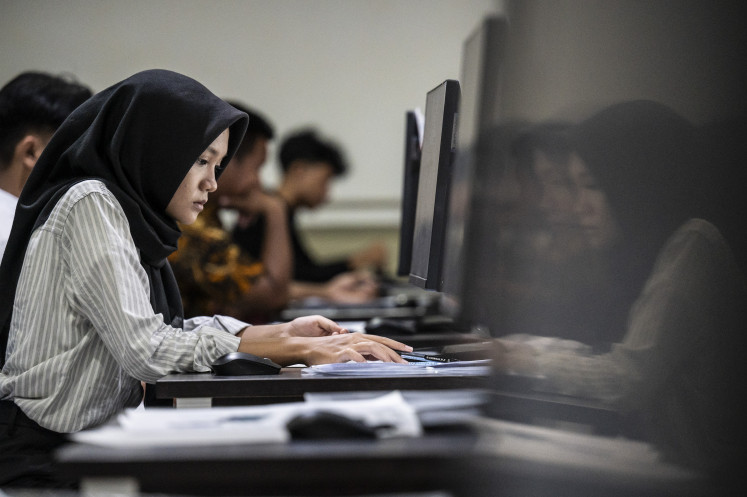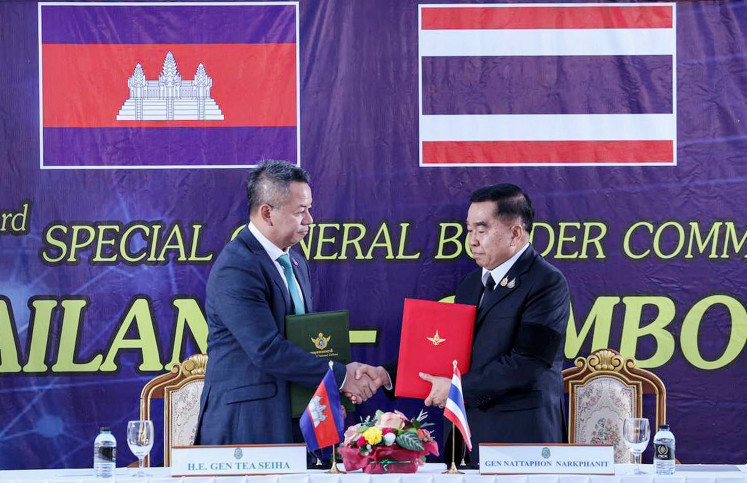Popular Reads
Top Results
Can't find what you're looking for?
View all search resultsPopular Reads
Top Results
Can't find what you're looking for?
View all search resultsThe next evolution of executive education
Executives will need an intellectual sparring partner as they confront an uncertain future.
Change text size
Gift Premium Articles
to Anyone
S
ince the advent of digital, disruption has been the main theme in business. COVID-19 was the crescendo-like culmination of this tumultuous era, bringing business-as-usual to a standstill and forcing firms to acquire brand-new capabilities at lightning speed. What we are seeing now is the beginning of a new era of even more profound changes.
Before the pandemic, new technologies were largely seen as powerful tools to help businesses play the game better. COVID-19 ripped several pages out of the rulebook, as leading innovators found ways to leverage technology that defied long-standing assumptions about what could and couldn’t be done in the virtual world and its potential impact on the physical world.
In order to be successful in this new era of digital transformation, leaders must master and write new management rules. This will require them to gain fluency in emerging technologies, and their impact on business and society. Needless to say, they should also prepare for further disruptions in the years ahead, perhaps due to climate change, political unrest, increasingly activist regulatory environments, etc. Tackling these challenges unassisted could be daunting and ineffective. Executives need a strong, dedicated partner invested in their success. Executive education provided by research-based institutions like INSEAD is best positioned to be that partner.
Academic institutions with expertise in both knowledge creation (i.e. research) and knowledge dissemination (teaching) have a unique ability to catalyze change through education. Their staunchly objective, data-driven analytical methods, honed to a razor’s edge through frequent exposure to academic peer review, amounts to a degree of rigor not usually found outside academia. At the same time, the interactive exercise of conveying ideas and gathering real-time feedback from thousands of executives from diverse industries and geographies ensures enduring relevance, over and above fieldwork and other common excursions outside the ivory tower.
This rare combination of rigor and relevance endows B-school academics with the flexibility to play two equally important but very different roles.
First, executives will need an intellectual sparring partner as they confront an uncertain future. Executive education should be a process of pushing and prodding participants out of their old habits and comfort zones – within a general atmosphere of psychological safety, of course. This will mean, among other things, probing the weak spots of their current strategies with structured thinking that compels participants to discover opportunities within disruption. It can also consist of challenging them to add new and more intricate skills and capabilities to strengthen their technological arsenal and bolster their strategic agility.
In this way, educators can help participants define their organization’s future in a way that is equitable, sustainable, and creates long-term value.
Second, executive education programs can create a neutral territory within which leaders can reckon with possible negative externalities of their business, including the new technologies deployed. The push toward stakeholder capitalism is placing firms in the unfamiliar position of having to consider social impact alongside profitability, and manage the ensuing trade-offs. Public discourse often unfairly holds firms solely responsible for the unintended consequences of technology, e.g. the threats to personal privacy posed by some of the innovations powering smart cities. Academics can facilitate a more productive and less punitive dialogue around these issues, accustomed as they are to viewing society through the lens of business. The diversity of backgrounds represented among B-school faculty – from economics to psychology and sociology – can help put these discussions in cohesive, comprehensive context. The impartiality of an academic setting can also accommodate outside expert perspectives, e.g. urban planners or VC investors, without compromising the pure spirit of inquiry.
Digital classrooms and asynchronous online learning were obligatory innovations imposed by COVID-19. After the pandemic passes, higher education will likely develop along a hybridized path leveraging the innate strengths of both physical and virtual paradigms (as INSEAD dean Ilian Mihov explained in an article from last year). The possibilities for executive education are especially exciting.
Digital technology empowers educators to transition from providing learning products to enabling (life-long) learning journeys. Collective experiences delivered in the classroom will continue to be crucial. With the hybrid model, however, comes the ability for individual participants to customize how they build upon the foundational knowledge acquired during in-person courses, setting their own pace of learning and selecting asynchronous or simultaneous modules as it suits them.
The world has long moved away from “Model T”-like commoditized products. It is time to make learning and personal development tailored to an individual’s needs and desired outcomes. Potentially, partnerships between educators and participants will gain in depth and duration as a result.
Research-based institutions cannot pull this off in isolation. There will have to be well-functioning ecosystems behind the scenes to facilitate learning journeys. Education providers will need to openly collaborate with technology providers, digital platforms, etc. For faculty and administrators used to a more siloed way of operating, this may prove challenging. The educators will have to learn and grow outside their comfort zone as well.
Like just about every other business in these volatile times, executive education must evolve – from detached “experts” to supportive partners, from instructional classroom to providing hybridized learning journeys – ultimately to train, motivate and inspire executives responsible for shaping our future world. It’s a big change. But research-based institutions have what it takes to make the leap, thanks to the rigor and relevance embedded in their DNA.
***
The writer is INSEAD dean of executive education.










